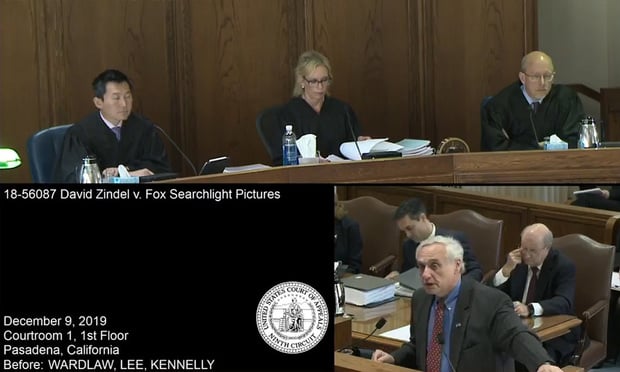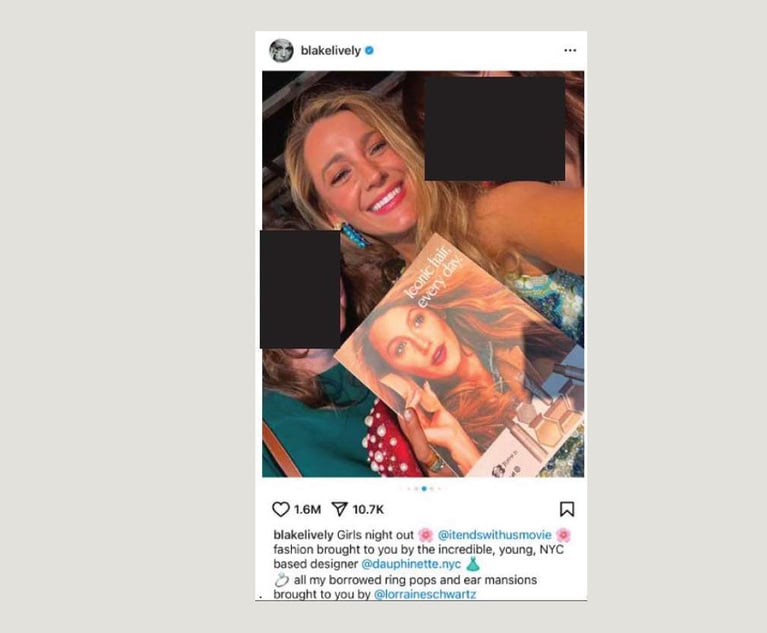Kozinski Contends Due Process Rights at Stake in Copyright Case Against 'Shape of Water' Filmmakers
Nearly two years after abruptly retiring amid sexual harassment allegations, the former chief judge of the U.S. Court of Appeals for the Ninth Circuit returned to the court to argue on behalf of the son of a playwright who claims the filmmakers ripped off copyrighted elements of his father's work.
December 09, 2019 at 03:06 PM
5 minute read
 Alex Kozinski, the former chief judge of the U.S. Court of Appeals for the Ninth Circuit, arguing in "Zindel v. Fox Searchlight Pictures." (Courtesy photo)
Alex Kozinski, the former chief judge of the U.S. Court of Appeals for the Ninth Circuit, arguing in "Zindel v. Fox Searchlight Pictures." (Courtesy photo)
Making his return to the U.S. Court of Appeals for the Ninth Circuit nearly two years after abruptly retiring from the bench amid sexual harassment allegations, Alex Kozinski on Monday urged a Ninth Circuit panel to revive a copyright lawsuit against the filmmakers behind the Academy Award-winning movie "The Shape of Water."
Kozinski contended that his client, the son of Pulitzer Prize-winning author Paul Zindel who claims that the film and its novelization infringe copyrighted elements of his father's play "Let Me Hear You Whisper," didn't get a fair shake from a district court judge. U.S. District Judge Percy Anderson dismissed the case last year on a motion to dismiss without taking any evidence or holding oral argument.
"A plaintiff, as a matter of due process, should be able to put in evidence," Kozinski said early in his argument.
Kozinski, who resigned in December 2017 after a string of female law clerks and, in one instance, a former judicial colleague from his prior stint on the U.S. Court of Federal Claims, accused him of sexual misconduct and harassment, opened his 15 minutes of allotted time by saying, "Good morning, may it please the court."
Judge Kim Wardlaw, the only one of the three panel judges who served on the bench alongside Kozinski, responded "good morning" from her center seat on the bench presiding over the argument. She and the other two panel members—Judge Kenneth Lee, a recent appointee of President Donald Trump, and U.S. District Judge Matthew Kennelly of the Northern District of Illinois, sitting by designation—had probing questions for double sides, particularly aimed at when, if at all, it's appropriate for a judge to dismiss a copyright case involving expressive literary works so early in a case.
Kennelly, in particular, asked Kozinski what expert testimony would add in a case such as this one. If a judge can't do a comparison on the basis of the works in front of them, Kennelly said, that's "a nice way of saying all these cases have to go to trial."
Lee, who appeared the most skeptical of Kozinski's argument to revive the case, asked if the plaintiff could raise a claim to substantial similarity between the works just on the basis that they all involve a female janitor who tries to smuggle a creature out of a lab in a clothes hamper. (In Zindel's work, a play often performed in middle and high schools, a female janitor plots to save a dolphin from a medical testing facility. The film and novel involve a female janitor who plots to help an Amazonian river god, whom she falls in love with, escape a military testing lab.) Lee suggested the idea of having a lowly character form a connection with a magical creature was "a typical Hollywood cliche."
"In Hollywood, as in life, there's nothing new under the sun," Kozinski said. "None of us build from scratch. We all stand on the shoulders of others."
"The question is whether or not what they've done here is taken the essence of the heart of Paul Zindel's play," Kozinski said.
The most pointed questions for the defendants, Jonathan Zavin of Loeb & Loeb, representing the filmmakers, and Davis Wright Tremaine's Kelli Sager, representing MacMillan Publishers, came from Wardlaw, who called it a "kind of hubris" for a judge to think he or she has enough knowledge of filmmaking and theater to dismiss copying claims at such an early stage.
The circumstances that would warrant such a treatment are "very rare and I would say it should be limited to the most frivolous of cases," Wardlaw said.
Zavin, for his part, said that this was "not a close case." Zavin urged the panel not to establish a rule that would mean virtually all copyright claims regarding expressive works move on to summary judgment. "Expert testimony is not going to change any of the elements" potentially protected by copyright, Zavin said. "Every piece of expression is different, except there's a cleaning lady and an animal, which we acknowledge," Zavin said.
During his rebuttal time, Kozinski asked the panel, if they do revive the lawsuit, to assign it to someone other than Anderson, whom Kozinski noted was his classmate at the University of California at Los Angeles School of Law. "Please consider sending it back to a judge who has not made up his or her mind," Kozinski said.
Read more:
Alex Kozinski Set to Return to 9th Circuit as Oral Advocate
Judge Alex Kozinski, Apologizing Amid Harassment Claims, Retires Immediately
Quinn Emanuel Defends Judge Alex Kozinski as Misconduct Claims Mount
This content has been archived. It is available through our partners, LexisNexis® and Bloomberg Law.
To view this content, please continue to their sites.
Not a Lexis Subscriber?
Subscribe Now
Not a Bloomberg Law Subscriber?
Subscribe Now
NOT FOR REPRINT
© 2025 ALM Global, LLC, All Rights Reserved. Request academic re-use from www.copyright.com. All other uses, submit a request to [email protected]. For more information visit Asset & Logo Licensing.
You Might Like
View All
Netflix Music Guru Becomes First GC of Startup Helping Independent Artists Monetize Catalogs
2 minute read
Justin Baldoni Sues Blake Lively and Ryan Reynolds for $400M in New Step in 'It Ends With Us' Fight
6 minute read
Patreon Hit With Lawsuit for Allegedly Diverting Subscriber Data to Meta

Music App Denied Injunction Against Apple Over Alleged Scheme to Block Its Access to App Store
Law Firms Mentioned
Trending Stories
- 15th Circuit Considers Challenge to Louisiana's Ten Commandments Law
- 2Crocs Accused of Padding Revenue With Channel-Stuffing HEYDUDE Shoes
- 3E-discovery Practitioners Are Racing to Adapt to Social Media’s Evolving Landscape
- 4The Law Firm Disrupted: For Office Policies, Big Law Has Its Ear to the Market, Not to Trump
- 5FTC Finalizes Child Online Privacy Rule Updates, But Ferguson Eyes Further Changes
Who Got The Work
J. Brugh Lower of Gibbons has entered an appearance for industrial equipment supplier Devco Corporation in a pending trademark infringement lawsuit. The suit, accusing the defendant of selling knock-off Graco products, was filed Dec. 18 in New Jersey District Court by Rivkin Radler on behalf of Graco Inc. and Graco Minnesota. The case, assigned to U.S. District Judge Zahid N. Quraishi, is 3:24-cv-11294, Graco Inc. et al v. Devco Corporation.
Who Got The Work
Rebecca Maller-Stein and Kent A. Yalowitz of Arnold & Porter Kaye Scholer have entered their appearances for Hanaco Venture Capital and its executives, Lior Prosor and David Frankel, in a pending securities lawsuit. The action, filed on Dec. 24 in New York Southern District Court by Zell, Aron & Co. on behalf of Goldeneye Advisors, accuses the defendants of negligently and fraudulently managing the plaintiff's $1 million investment. The case, assigned to U.S. District Judge Vernon S. Broderick, is 1:24-cv-09918, Goldeneye Advisors, LLC v. Hanaco Venture Capital, Ltd. et al.
Who Got The Work
Attorneys from A&O Shearman has stepped in as defense counsel for Toronto-Dominion Bank and other defendants in a pending securities class action. The suit, filed Dec. 11 in New York Southern District Court by Bleichmar Fonti & Auld, accuses the defendants of concealing the bank's 'pervasive' deficiencies in regards to its compliance with the Bank Secrecy Act and the quality of its anti-money laundering controls. The case, assigned to U.S. District Judge Arun Subramanian, is 1:24-cv-09445, Gonzalez v. The Toronto-Dominion Bank et al.
Who Got The Work
Crown Castle International, a Pennsylvania company providing shared communications infrastructure, has turned to Luke D. Wolf of Gordon Rees Scully Mansukhani to fend off a pending breach-of-contract lawsuit. The court action, filed Nov. 25 in Michigan Eastern District Court by Hooper Hathaway PC on behalf of The Town Residences LLC, accuses Crown Castle of failing to transfer approximately $30,000 in utility payments from T-Mobile in breach of a roof-top lease and assignment agreement. The case, assigned to U.S. District Judge Susan K. Declercq, is 2:24-cv-13131, The Town Residences LLC v. T-Mobile US, Inc. et al.
Who Got The Work
Wilfred P. Coronato and Daniel M. Schwartz of McCarter & English have stepped in as defense counsel to Electrolux Home Products Inc. in a pending product liability lawsuit. The court action, filed Nov. 26 in New York Eastern District Court by Poulos Lopiccolo PC and Nagel Rice LLP on behalf of David Stern, alleges that the defendant's refrigerators’ drawers and shelving repeatedly break and fall apart within months after purchase. The case, assigned to U.S. District Judge Joan M. Azrack, is 2:24-cv-08204, Stern v. Electrolux Home Products, Inc.
Featured Firms
Law Offices of Gary Martin Hays & Associates, P.C.
(470) 294-1674
Law Offices of Mark E. Salomone
(857) 444-6468
Smith & Hassler
(713) 739-1250






